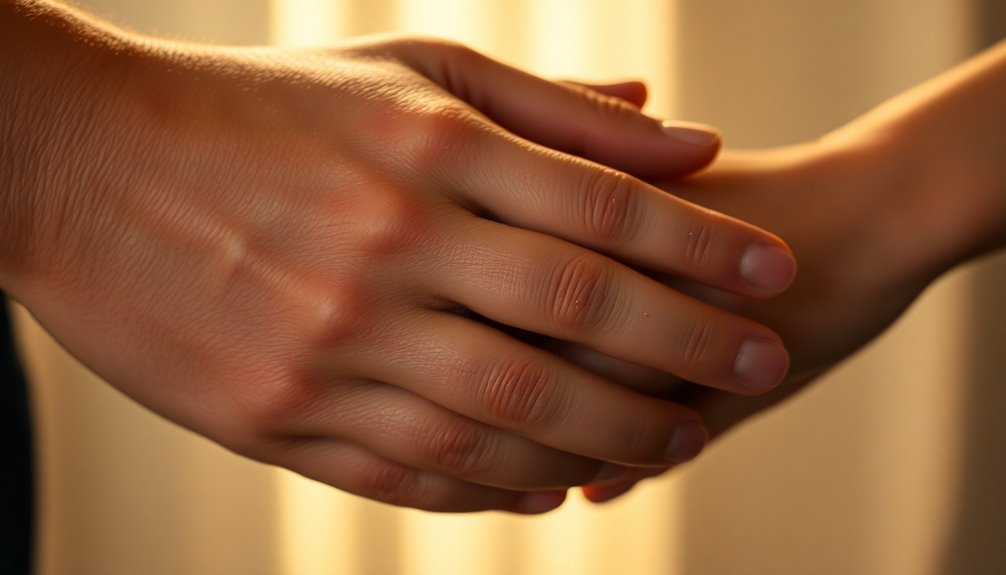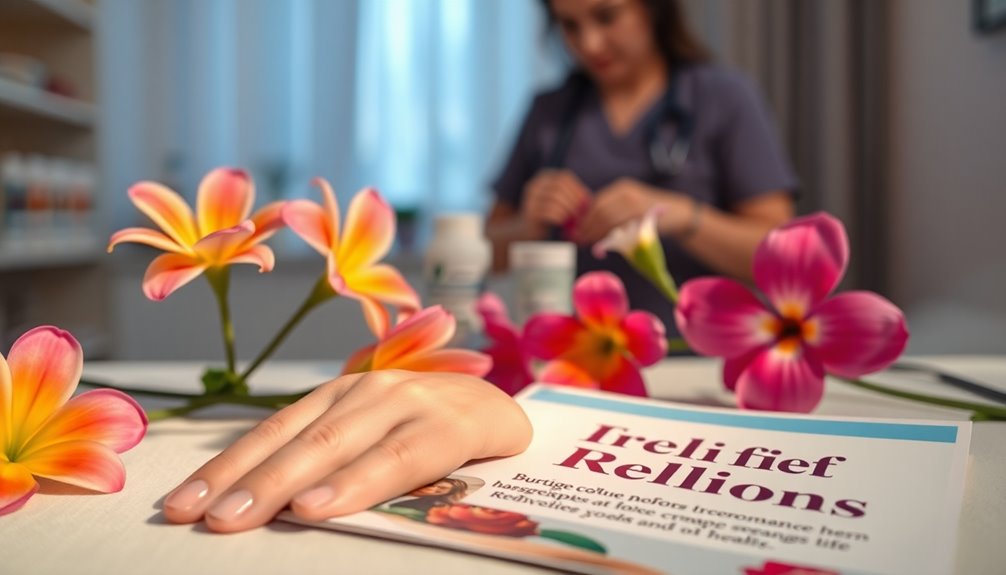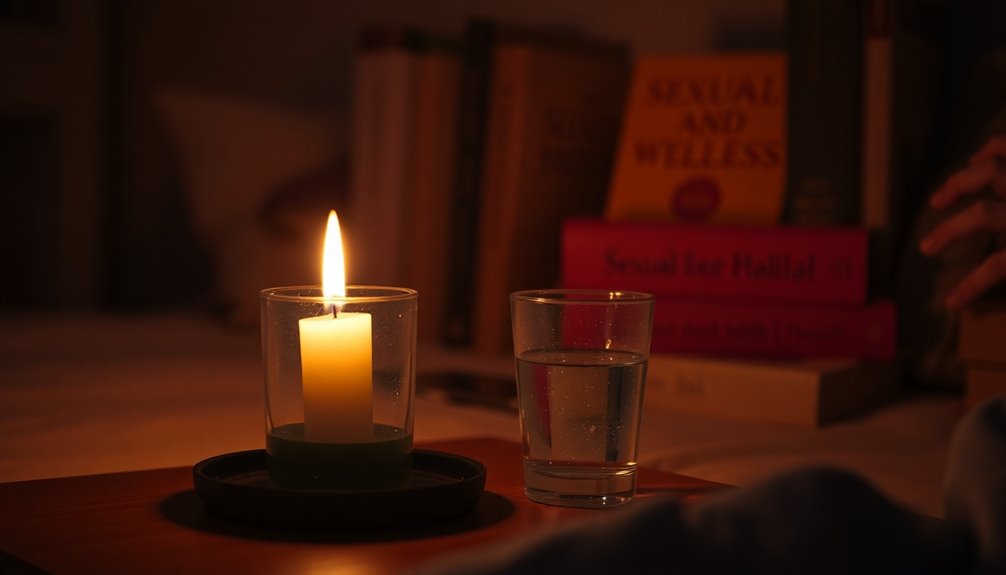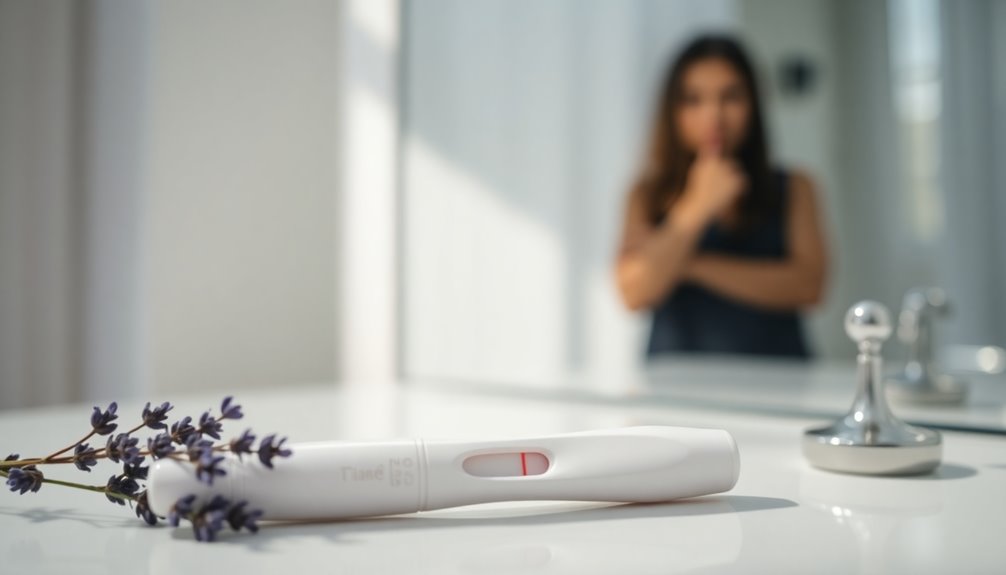If you experience burning after sex, it could stem from several issues. Vaginal dryness, often due to hormonal changes, is a common culprit. Infections like yeast infections or UTIs can also irritate tissues, causing discomfort. Lack of lubrication during intercourse can create friction, leading to micro-tears. Psychological factors, such as anxiety, might heighten muscle tension, contributing to the sensation. If the burning persists or is associated with other symptoms, it's important to consult a healthcare professional. Understanding the underlying causes can help you find effective relief and improve your overall sexual health.
Key Takeaways
- Burning after sex may result from vaginal dryness, especially during menopause or postpartum, leading to irritation.
- Insufficient lubrication during intercourse can cause friction, resulting in discomfort and a burning sensation.
- Infections like yeast infections or UTIs are common causes of post-coital burning and should be evaluated.
- Allergic reactions to condoms, lubricants, or spermicides can lead to irritation and burning during or after sex.
- Micro-tears from rough sex or inadequate lubrication can cause soreness and burning sensations post-intercourse.
Understanding Burning Sensations

When you experience a burning sensation after sex, it's essential to understand that it can stem from various factors.
One common issue is vaginal dryness, which can be caused by hormonal changes, particularly during menopause or postpartum periods. This dryness can make intercourse uncomfortable and lead to that burning feeling.
Infections also play a significant role; conditions like yeast infections, bacterial vaginosis, and UTIs can cause irritation and discomfort during and after sex.
Additionally, certain medical conditions, such as vaginismus and vulvodynia, might contribute to involuntary muscle contractions or chronic pain, intensifying the burning sensation.
Even psychological factors like anxiety can lead to muscle tension, making the experience even more uncomfortable. Furthermore, understanding the connection between hormonal changes and discomfort can help in addressing the issue effectively.
Understanding these factors is essential for addressing the issue effectively.
Common Causes of Discomfort

You might experience burning after sex due to a lack of lubrication, which can lead to irritation.
Infections and anatomical factors, like positioning during intercourse, can also contribute to discomfort.
Understanding these common causes can help you address the issue effectively.
Lack of Lubrication
Though many might not realize it, lack of lubrication during sex can lead to significant discomfort and burning sensations. Vaginal dryness, often caused by hormonal fluctuations or stress, can make adequate lubrication essential for an enjoyable experience. You're not alone; nearly 3 out of 4 vulva owners deal with this issue at some point. Using lubricants can help alleviate these discomforts.
| Causes | Solutions |
|---|---|
| Hormonal fluctuations | Water-based lubricants |
| Stress | Silicone-based lubricants |
| Inadequate arousal | Personal lubricants |
| Aging | Natural oils |
If you experience persistent burning after sex, consider integrating lubricants into your practices to prevent discomfort. Your pleasure matters!
Infections and Irritations
Burning sensations after sex can often stem from infections and irritations that affect the vaginal area. Conditions like yeast infections, bacterial vaginosis (BV), and sexually transmitted infections (STIs) are common culprits, causing inflammation and irritation of the vaginal tissues.
Additionally, factors such as:
- Rough sex or insufficient lubrication
- Allergic reactions to condoms, lubricants, or spermicides
- Urinary tract infections (UTIs)
can also lead to discomfort.
Even chronic conditions like vulvodynia may result in burning sensations during or after sexual activity. It's important to be aware that early detection of any underlying issues can significantly improve treatment outcomes and overall health.
If you experience persistent irritation or a burning sensation, it's vital to consult a healthcare professional to determine the underlying cause and receive appropriate treatment.
Taking care of your sexual health is important for your overall well-being.
Anatomical Factors and Positioning
When engaging in sexual activity, anatomical factors and positioning can considerably impact comfort levels, often leading to discomfort or burning sensations. Variations in genital shapes, along with the position of the cervix, can contribute to friction and pain during penetration. For those with a tilted cervix, certain positions, like rear-entry, may increase pressure on sensitive areas, exacerbating discomfort. Additionally, inadequate lubrication can cause micro-tears in the vaginal canal or penile tissue, resulting in post-coital burning.
| Factor | Description | Impact on Comfort |
|---|---|---|
| Anatomical Differences | Variations in genital shapes and sizes | Increased friction and pain |
| Vaginal Canal Width | Narrow vaginal canal | Heightened sensitivity |
| Cervix Position | Tilted or sensitive cervix | Discomfort during deep penetration |
Infections and Their Impact

Infections can play a significant role in that burning sensation you might feel after sex.
Common culprits like UTIs, yeast infections, and STIs can bring about uncomfortable symptoms that demand attention.
Understanding these infections and their symptoms is key to finding relief and preventing further complications.
Common Infections Explained
Understanding the various infections that can cause discomfort during or after sex is essential for maintaining sexual health.
Here are some common infections to be aware of:
- Sexually transmitted infections (STIs): Conditions like chlamydia and gonorrhea can lead to burning sensations and unusual discharge during or after sex.
- Urinary tract infections (UTIs): These can trigger significant discomfort, presenting as burning during urination and increased urgency, especially post-intercourse.
- Yeast infections: Characterized by burning, itchiness, and thick white discharge, these infections often indicate an imbalance in vaginal flora.
Recognizing the signs of these infections is vital, as early intervention can help restore comfort and well-being, allowing for a healthier sexual experience.
Symptoms and Diagnosis
How can you tell if that burning sensation after sex is something serious? If you notice additional symptoms like abnormal discharge, itching, or frequent urination, it might indicate infections such as yeast infections, bacterial vaginosis, or urinary tract infections (UTIs).
Diagnosis typically involves a physical examination and laboratory tests like urine cultures or swabs to pinpoint the specific pathogen. Persistent burning that doesn't go away may suggest underlying conditions like vulvodynia or vaginismus, which need specialized evaluation.
Timely diagnosis and treatment are crucial to prevent complications and protect your sexual health. Often, appropriate antibiotics or antifungal medications can effectively resolve these infections and help you get back to enjoying intimacy without discomfort.
Don't hesitate to consult a healthcare provider if you're concerned.
Hormonal Influences on Pain

When hormonal fluctuations occur, they can particularly influence your body's response during and after sex, often leading to discomfort.
Factors like menopause can greatly decrease estrogen levels, resulting in vaginal dryness and burning sensations. Additionally, hormonal contraceptives and conditions like Polycystic Ovary Syndrome (PCOS) may disrupt your hormonal balance, causing similar issues.
Here are some key points to examine:
- Hormonal changes can reduce vaginal lubrication.
- Menopause often leads to vaginal atrophy and discomfort.
- Hormone replacement therapy (HRT) may help restore lubrication.
- Seeking emotional support can also enhance overall well-being during these changes.
Understanding these influences can empower you to address any discomfort you experience, ensuring a more pleasurable sexual experience.
Psychological Factors to Consider

Hormonal influences aren't the only contributors to discomfort after sex; psychological factors play a significant role too.
Anxiety and stress can lead to increased muscle tension in your pelvic region, causing pain or burning sensations. If you anticipate discomfort, you might create a psychological barrier, cycling through fear and tension that worsens your physical symptoms during intimacy.
For those with a history of sexual trauma, heightened sensitivity can cause pain despite adequate lubrication. Communication issues with your partner about preferences and boundaries can also generate anxiety, impacting your arousal.
Addressing these psychological factors through therapy can be essential in managing anxiety and improving your sexual experiences, ultimately helping you regain comfort and enjoyment.
Prevention and Relief Strategies

To prevent and relieve the burning sensations that can occur after sex, consider adopting a few effective strategies. Here are some relief strategies that can make a difference:
- Use water-based or silicone-based lubricants to minimize friction.
- Switch to non-spermicide latex condoms to reduce irritation from chemicals.
- Communicate openly with your partner about comfort levels and movements.
Incorporating pelvic floor exercises or physical therapy can also strengthen your pelvic muscles, potentially easing discomfort during and after sex.
If you experience a burning sensation post-intercourse, applying a cold compress to the affected area can provide immediate relief.
When to Seek Medical Help

If you're experiencing persistent pain after sex, it's vital to seek medical help.
Pay attention to any additional symptoms like fever or unusual discharge, as these can indicate a more serious issue.
Don't wait for home remedies to work; consulting a healthcare provider is essential for your well-being.
Persistent Pain After Intercourse
Experiencing persistent pain after intercourse can be alarming and may signal underlying health issues that shouldn't be ignored. If you notice vaginal burning or pain during intercourse lasting more than a few days, it's time to seek medical help.
Here are some signs to take into account:
- If home remedies and over-the-counter treatments don't relieve your discomfort.
- When pain affects your sexual activity and quality of life.
- If you experience additional symptoms like fever or unusual discharge.
Consulting a healthcare provider is essential to rule out conditions such as vulvodynia or vaginismus.
A thorough assessment by a gynecologist or sexual health specialist can lead to the appropriate diagnosis and treatment, ensuring your well-being and comfort.
Additional Symptoms to Watch
When burning sensations follow intercourse, it's crucial to pay attention to any accompanying symptoms that may indicate a more serious issue.
If you notice unusual discharge—like a thick white or fishy odor—this could signal an infection that requires medical evaluation.
Persistent burning after sex, especially if it worsens or doesn't improve, should prompt you to consult a healthcare provider.
Additional symptoms like fever, chills, or severe abdominal pain alongside the burning sensation after sex might indicate conditions like pelvic inflammatory disease (PID) or a urinary tract infection (UTI).
If burning occurs during urination, seek prompt medical attention, as this could suggest urethritis or a UTI.
Don't ignore a consistent pattern of pain or burning after sexual activity; it's crucial to get help.
Treatment Options Available

To alleviate the burning sensations after sex, various treatment options are available that can effectively address the underlying issues.
Start with water-based or silicone-based lubricants to reduce friction and irritation. If you suspect infections, consult a healthcare provider who may prescribe antibiotics for bacterial infections or antifungal medications for yeast infections.
For those experiencing vaginal dryness, hormonal treatments like topical estrogen or hormone replacement therapy can be beneficial.
Additionally, consider these options:
- Pelvic floor physical therapy for relaxation techniques
- Over-the-counter topical anesthetics for temporary relief
- Regular consultations with a healthcare professional for accurate diagnosis
Taking these steps can help you manage discomfort and improve your overall sexual health.
Impact on Sexual Health

Burning sensations after sex can greatly affect your sexual health and overall well-being. Experiencing a burning sensation during intercourse can lead to anxiety and avoidance of sexual activity, straining your intimate relationships.
Conditions like vulvodynia or vaginismus can exacerbate these feelings, decreasing your libido and satisfaction. If infections causing these sensations, such as UTIs or STIs, aren't treated, they might result in serious reproductive health issues over time.
Additionally, insufficient lubrication can increase friction, leading to injuries and a cycle of pain that deters future intimacy.
Open communication with your partner about discomfort is essential; it fosters understanding and support, ultimately enhancing your sexual health and improving your experiences together.
Resources for Further Support

Experiencing discomfort after sex can be challenging, but you're not alone, and support is available. Numerous resources can help you navigate this issue more effectively.
- Healthcare Professionals: Consult a gynecologist or urologist for tailored care and accurate diagnosis.
- Support Groups: Join in-person or online support groups to connect with others who share similar experiences and offer emotional support.
- Educational Resources: Utilize reputable websites and literature focused on sexual health to understand potential causes and prevention strategies.
Don't hesitate to reach out to therapists or specialized sexual health clinics if needed, as they can provide extensive screenings and additional support.
Frequently Asked Questions
Is It Normal for Sex to Burn After?
No, it isn't normal for sex to burn afterward.
If you're experiencing a burning sensation, it could signal an underlying issue like dryness, friction, or an infection.
You should pay attention to your body; persistent burning warrants a visit to your healthcare provider.
They can help identify the cause and recommend appropriate treatments, like lubricants or medications, to make your experiences more comfortable and enjoyable.
Don't hesitate to seek help!
Why Do I Feel Burning Sensation in My Body After Sex?
After sex, you might feel like your body's been set ablaze! That burning sensation can stem from friction, irritation, or even dryness.
If you've been battling infections like UTIs or yeast infections, they could be the culprits too. Hormonal changes or anxiety can play a role, tightening things up when you least expect it.
If the burning doesn't let up, don't hesitate to get checked out. Your comfort matters!
Why Does Sperm Burn Inside of Me?
Sperm can burn inside you for several reasons.
If you're sensitive, the enzymes and proteins in sperm might irritate your vaginal tissues, especially without enough lubrication.
The alkaline pH of sperm can disrupt your vagina's natural balance, causing discomfort.
If you have allergies to proteins in sperm, you might experience localized inflammation.
Additionally, certain contraceptives like spermicides can irritate your tissues, leading to that burning sensation.
It's worth consulting a healthcare professional for personalized advice.
How Do I Stop the Burning Down There?
That burning down there can feel like a thousand tiny fire ants are marching around!
To stop it, start using water-based or silicone-based lubricants to reduce friction. If you suspect allergies, switch to non-spermicide, latex-free condoms.
Good hygiene is essential—wash before and after sex. Engage in more foreplay to boost natural lubrication.
If the burning doesn't go away, don't hesitate to consult a healthcare provider for a thorough check-up.
Conclusion
To sum up, if you're experiencing burning after sex, it's crucial to listen to your body—it's your way of signaling that something's not right. Whether it's an infection or hormonal changes, don't let discomfort dim your intimacy. Seek medical advice if the pain persists, and explore treatment options to reignite your sexual health. Remember, a healthy sex life is like a well-tended garden; it thrives when you nurture it and address any weeds that pop up.










